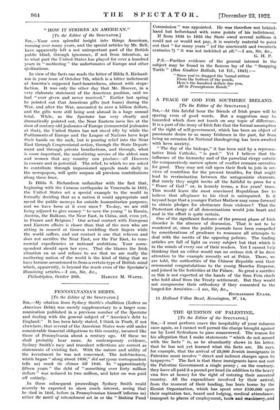" HOW IT STRIKES AN AMERICAN."
[To the Editor of the SPECTATOR.]
own splendid insight into things American, running over many years, and the special articles by Mr. Bell, have apparently left a not unimportant part of the British public blind, through ignorance, if not from intention, as to what part the United States has played for over a hundred years in " mothering " the unfortunates of Europe and other cjvilizations.
In view of the facts one reads the letter of Hilda S. Richard- son in your issue of October 7th, which is a bitter indictment of America's supposed hard-heartedness, almost with stupe- faction. It was only the other day that Mr. Hoover, in a very elaborate statement of the American position, said we had " ever given and never received." Earlier last spring he pointed out that American gifts (not loans) during the War, and after the War, amounted to over a billion dollars, and the gifts were still being sent abroad in a huge annual total. While, as the Spectator has very clearly and dramatically pointed out, the Near Eastern mess lies at the door of century-old jealousies of Europe (commercial jealousies at that), the United States has not stood idly by while the Parliaments of Europe and the League of Nations have kept their hands on the sack, but is pouring relief into the Near East through Congressional action, through the State Depart- ment and through private benefactions, and through, what is more important, the soul-stirring service of the ablest men and women that any country can produce—all Hoovers in essence and in potential. The relief, to which we are asked to contribute through impassioned appeals made daily in the newspapers, will quite surpass all previous contributions along these lines.
Is Hilda S. Richardson unfamiliar with the fact that, beginning with the Caracas earthquake in Venezuela in 1812, the United States set a special example to the world in formally deciding that as a nation it could appropriate and spend the public moneys for outside humanitarian purposes, and we have been at it ever since ? To-day, we are still being adjured to give money " to save the young " in Russia, Austria, the Balkans, the Near East, in China, and, even yet, in France and Belgium ! Our actual contact with European and Eastern affairs is closer than that of the men who are sitting in council at Geneva twiddling their fingers while the world suffers, and our contact is one that relieves and does not sacrifice the Near East, nor the Far East, to com- mercial expediencies or national ambitions. Your corre- spondent should open her eyes. That she blames the Irish situation on us and refuses to see that we are really the mothering nation of the world is the kind of thing that we have become accustomed to from a certain type of British mind which, apparently, is beyond the reach even of the Spectator's illumining articles.—I am, Sir, &c., SIn,—Your










































 Previous page
Previous page